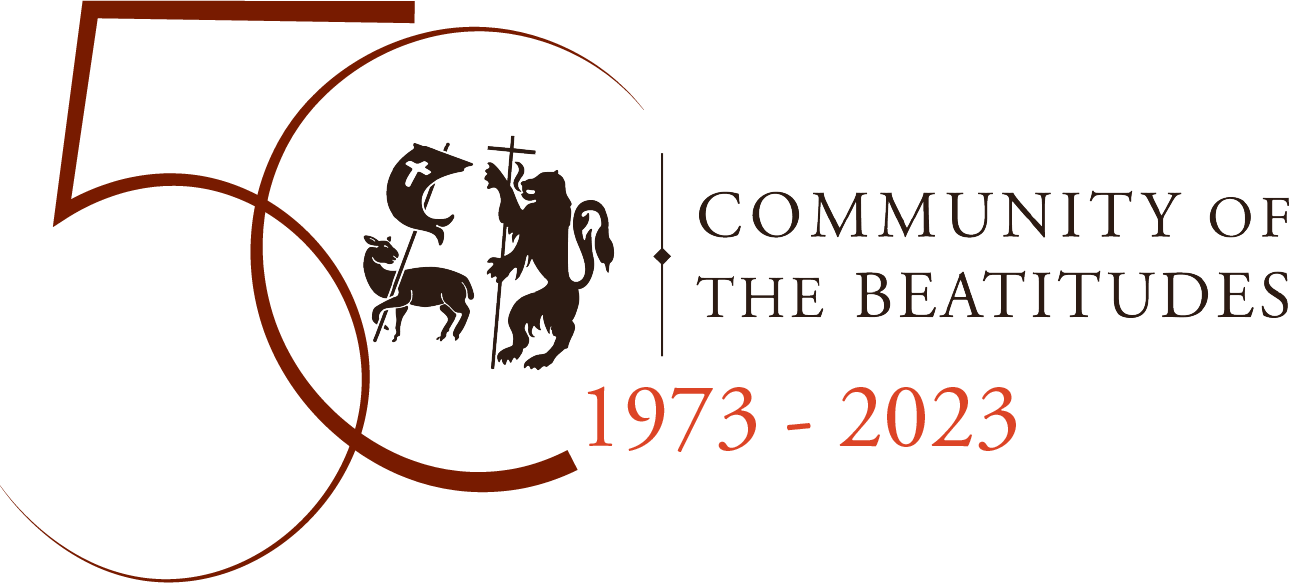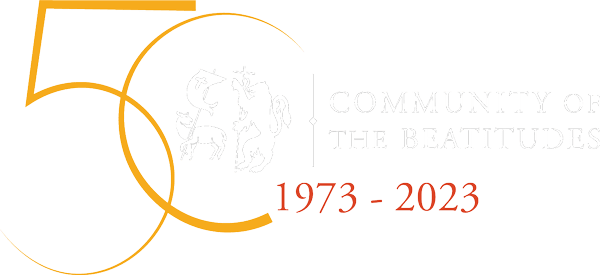Testimonies

Question: Rachel, the better half of Rachel and Josh – you met the Community here in Denver. Please share a little about how you met them as a lay couple, and how you came to join them here in Denver.
Rachel: The Community of the Beatitudes accepts couples as couples. You can’t go just as one or the other. It was my husband who was first like, “Let’s join the Community of the Beatitudes!” And then he had to then reel me in slowly over the years, until there was a moment of, “Why don’t we join the Community of the Beatitudes?” And the minute we did, the graces of the Community just poured on me in my life. It has been a huge blessing. It strengthened our marriage and I think the kids benefit… To live for the Lord is the only way to live.

Question: The Community has a special commitment to adoration and contemplation. Please share a bit about how this touches your life.
Sr. Emmanuelle: The contemplative life is about seeking God, putting Him first, and creating a space in our lives where we can encounter Him in a deep and personal way. In Community, this aspect of striving for union with God – obviously it’s going to be different for each person, depending on your state of life, if you’re are married or not – but we all incorporate something into our life to create this space for God: this sacred space where we go meet Him, and He meets us. That’s where He reveals to us who we are and tells us that He loves us, and where He reveals Who He is, and we get to tell Him that we love Him. It’s this place where we encounter God and love and be loved by Him. It happens in Adoration, but it can happen in so many different ways. For each one of us it’s important for us to find a way for it to happen and to grow in it, because this is really the goal of our life. That’s part of our charism, that’s part of our life. I’m very happy to have this be part of our life.

Question: Why did you choose to be a priest in Community rather than a diocesan priest?
Fr. Luc-Marie: Because there’s a verse in Genesis Chapter Two which says, “It is not good for man to be alone.” You understand? Not good. And for a guy like me, it is awful to be alone. Especially me. So the Lord put me into a community. I never thought about being a diocesan priest. They are very holy, maybe more holy than religious [are]. But when I received the call to consecrated life and to priesthood, it was evident to me that I was called to live this in a community. I cannot imagine myself alone in my rectory dealing with everything. I think this is my reason, but the Lord also pushed me in this way, because he knows me more than myself.
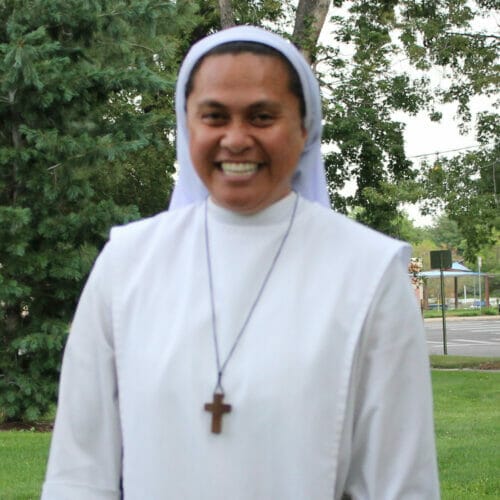
Question: You have recently been through the novitiate – please share a fun or touching moment of this aspect of the Community’s formation.
Sr. Monica: One of the great things that I loved about the novitiate was – well, as you know you are always discerning, discerning, discerning – but the novitiate was a time set apart. It was almost like a nine-month retreat, but even more than that: [it was] where we discovered and were able to discern more and more what it was to be called as a consecrated. We would read through church documents and everything, but it was even more of a time when you were purified in yourself. One of the things sister talked about was the difference between our ideals and our reality; during the novitiate we realized what we thought was a religious, and what we actually were like. There were six of us at the time, and each one of us was unique and really loved by God in our uniqueness, even though sometimes we really wanted to kill each other! We are all really loved by God, you know! And that was the beauty of it. That’s the Beatitudes: living to be blessed, more blessed in God’s eyes. It was really beautiful.

Question: What does living by the weekly liturgical rhythm of the Beatitudes mean to you, and how does this manifest in your daily lives?
Deacon Colin: So, what does the weekly liturgy mean for us as a couple and as individuals? Well, beginning the day in God’s Word through the Psalms and Sacred Scripture, through the New Testament, is a real joy. Just to soak in God’s Word. And when we’re able to join the Community for prayer, it’s the beauty of the liturgy. And it’s that rhythm. Like our heart beats and keeps us going – it’s that same rhythm for us. As a couple, there’s a beauty there, whether we do it in community or individually.
Maria Coleman: When we first joined the community, I only felt I was praying when I got to the Office, in the chapel. It was a slow process to realize, “Oh! I can pray all the time!” And I guess that’s what the weekly liturgy has led me to: that you can be in the presence of God all the time. And it’s just practicing the presence of God, the silence of the chapel – being with God at every moment. But, it’s always a special grace when you get to be with your brothers and sisters because it’s a taste of heaven.
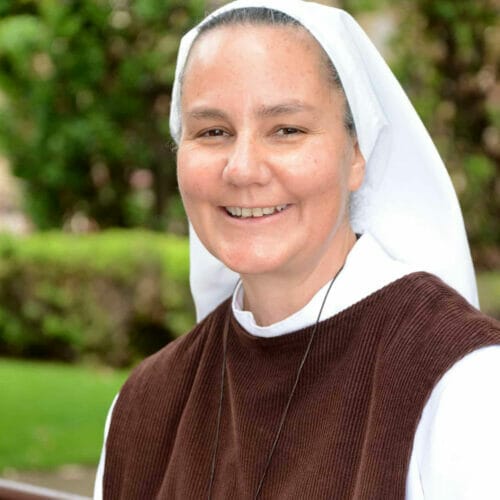
Question: The Beatitudes have a deep connection with the Jewish roots of our faith. How does this aspect of our charism lead you closer to Jesus?
Sr. Magdalit: God took so much love and so much care to prepare His coming to us, and He prepared that with the Jewish people first. To understand Judaism makes me understand the love, the tenderness, the details of God preparing us for His coming, His coming on earth through the person of Jesus – and Jesus is a Jew. To understand Jesus in his Judaity makes me understand that only the roots of my faith, of your faith as a Christian, make me understand the roots of the New Testament, the background of the New Testament. Because when you have more knowledge of Judaism, there are things in the New Testament that you catch. Like the woman that grabs Jesus by the tassels: if you know that it’s a commandment from the Lord in the Old Covenant, you understand that when she grabs Him, it’s literal. I mean that there actually are tassels on His vestments, and that means something. So, His Judaity helps me to understand Him. God loved us so much, that He prepared all this to come to us and to bring us back home. And that’s where the Jewish people come also in, in that I’m moved to know that there will be one day when we’ll all be one. One heart beating around God. And in this, the Jewish people have a place, because they brought concretely the prophecies to unfold to the point where Jesus came. And for me it’s eschatological, which is a technological word to say that it’s about the beginning and it’s about the end, where we’re going.

Question: You’ve been in the Community since the very beginning. What was an experience for you that confirmed that God was calling the Community into existence?
Sr. Helen: There are different things that attract me to the Community and that I find important for the world. I think really the Jewish roots make me much more Catholic because it fulfills my Catholic faith. It’s a lack if we don’t dig for our roots. And the fact that we drink from our Jewish roots nourishes my Catholic faith. It’s very important for the Church, because the more people are rooted in Jewish beliefs, the more the Church is richer, is fuller. That is one aspect.
The second thing is the importance of the Liturgy. Often, we want to do things and work, work, work. But the Liturgy is what? It is turning to God and asking to bring heaven on earth. We are a group of people in this Community [who are] very poor, but all together we ask the Lord to bring heaven on earth. For me, when I assist at the Liturgy, the heavens come down and touch my heart. No need to do things – it’s God who is touching the heart, it is God who is converting us. And I think it is important also to find that in the Church. We do a lot of things, which are wonderful, but we don’t let God come down very often. Our vocation is to let God come down to the Liturgy so that it will touch the heart. It makes a job for God. And that is the second point I find important: the importance of the Liturgy and it’s efficacy for the world.
And what I find important also is the life in the Spirit. It’s the same as the liturgy: we ask the Holy Spirit to fall down, touch our heart, and do His job by converting the people and bringing them to God.

Question: You are a very joyful person. How do you see joy manifested in our charism, and how do you live this joy in our daily communal life?
Sr. Mary of the Visitation: I think it’s an interesting question, because if I should describe the Community, I think joy is the crossing line through everything. It’s like what others were saying. This eschatological expectation that Jesus is already there. He’s already here with us. His Kingdom is really within us, and at the same time we really expect more. He needs to come back, because it’s a mess over here. Sometimes it’s the same within us, and it’s such an amazing joy, because we’ll see Him face to face. Concretely, I think we can face joy in so many different ways. So many times, we can think of joy like an exultation; and it’s true, there is an exultation in joy. And it’s an exultation because wow, when we experience God, that’s an exultation! And when we experience true love among ourselves, that’s an exultation. But there are different tastes in joy. There is also I think this tenderness, joyful, peaceful tenderness, when we forgive one another. And there can also be a sorrowful joy, when suffering and joy are together; on the Cross we experience the presence of Jesus, and it can transfigure this suffering. In that, we can actually taste His presence, and transfigure the Cross into a glorious Cross. There are so many different ways to experience joy in our daily lives. It can be in liturgy, praising God. It can be in cooking for one another, or forgiving one another because we were bad to each other. It can be in so many different ways. I think it’s very concrete. We always say that the Community is a school of love, but I think it’s also a school of joy.

Question: Father Nilson, what does it mean for you to live in an “Ecclesial Family of Consecrated Life”?
Fr. Nilson: The Community of the Beatitudes is the first to receive this designation “Ecclesial Family of Consecrated Life.” With something this new, the Church always finds a way to protect and encourage an authentic charism. Beyond this institutional aspect, what unites us – laity, consecrated brothers and sisters – is the call to follow Christ, to be disciples-missionaries, to serve the Church according to our particular spirituality.
We live in community not because it is “cool” but because there is an urgency of the times: the Lord is coming! In this perspective, through our life of contemplative union with God we can hasten his Kingdom, the mission is a duty to prepare hearts to welcome Him, the Lord’s prayer for the unity of His disciples will be realized (“They may all be one, Father!”, John 17:21), and at the end of time God will fulfill His promises to the people of the First Covenant (see Romans 11).
I believe that the different vocations in the Community is a real support to one another. When I see the generosity of our couples towards their children, I am encouraged to give of myself wholeheartedly to all. We consecrated persons who profess the vows of chastity, poverty and obedience bear witness to them that only the love of Christ is sufficient for us and fills a heart. We all will live it in eternity, since “at the resurrection [men and women] they neither marry nor are given in marriage” (Matt 22:30), for “God may be all in all” (1Co 15:28).

Question: Steve, you are a postulant for the Brothers Branch. How did your international experience (America, France, Israel, and Lebanon) encourage your vocation for consecrated life in the Community of the Beatitudes?
Steve: My international experience with the Community has been an incredible gift! These experiences have each in their own way encouraged me in my personal discernment of consecrated life in the Community. The greatest encouragement has been seeing how the Community lives out the Christian family experience. I have experienced family in the Community on three different continents, in four different languages, and in five different houses. Each house is its own family unit, but at the same time is united to the greater family of the Community across the globe and to the Church. Furthermore, even though I am a young American who only knows English, each house I have visited has been more than ready to welcome me with a familial love! Despite the obvious language and/or cultural barriers, when in a Community house I have never felt out of place. “So in Christ we, though many, form one body, and each member belongs to all the others.” Romans 12:5

Question: Father Anthony, you are the first American vocation for the community and for many years you lead a ministry with young adults “Beatitudes Missions.” What the charism of the Community of the Beatitudes challenges the youth the most?
Father Anthony: Authentic community! Both on the road and in Community houses in different countries, we live out an intense experience of small community, focused on prayer and charity. Our young missionaries, pilgrims, and interns love friendship and have deep ideals of family and Church. They desire intense relationships and communion for their vocation to marriage or religious life. Our emphasis on authentic community attracts them to our programs and is often an overwhelming take-away. At the same time, committed relationships with people you did not choose is different from friendship and romance. Daily faithfulness, communication, and charity in the little things exposes our weaknesses, selfishness, and hypocrisy. St. Therese, lead us to your Little Way!
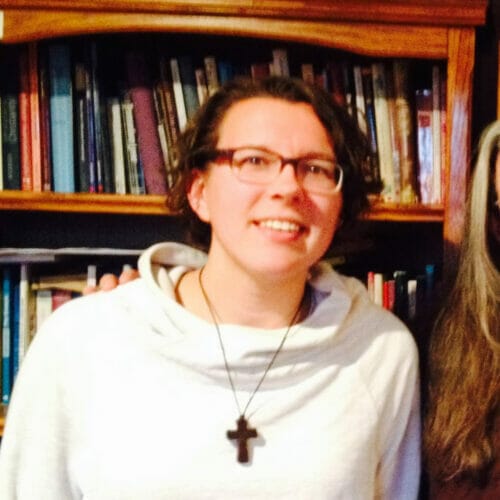
Question: Samantha, one aspect of the charism of the Community of the Beatitudes is the communion of the states of life (consecrated sisters, consecrated brothers, and lay members). How did this specifically help you to discern your own vocation?
Samantha: The first time I visited the Community, the communion of the states of life made me feel right at home. The Beatitudes are one big family. It’s like in heaven where all the people of God are together and united in Christ, yet each person is so different. This meant that I didn’t have to try and fit into a certain box, but I could just keeping taking steps closer to Jesus and let my call to consecrated life grow and develop. After spending time living, praying, and serving alongside both lay people and consecrated sisters, it became clear for me that my heart wanted Jesus as my Spouse.
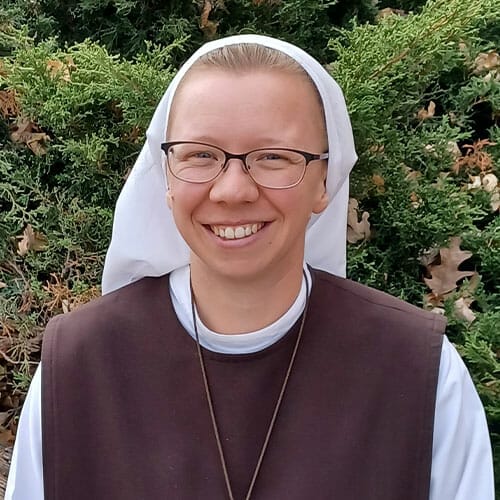
Question: What is the importance of the Virgin Mary in the spirituality of the community of the Beatitudes?
Sr. Sarah: Mary’s presence in our lives stems from our desire to follow Christ. In order to become a man, Jesus allowed himself to be shaped in the womb of Mary. Following her, we want to let ourselves be shaped by Mary, so that she gives birth to us to divine life, that she teaches us her Fiat, her abandonment and the contemplation of her son Jesus, in moments of joy, as at the foot of the cross. She is our mother, our model, our guide.
Her importance is visible in our spirituality: every morning, we consecrate ourselves to her to give her our day, we always turn to her at the end of the liturgy, and we invoke her with the rosary or other forms of prayer…
She is important to us, but most of all, we experience that we are important to her. “The community belongs to the Virgin Mary,” Venerable Marthe Robin told us, a stigmated French mystic. And it is very true! Many of us can testify how Mary came to take her place in their life of faith, discreetly, but surely!

Question: Mirjana, you are a postulant for the Sisters Branch. Vatican II says that “in the earthly liturgy, we take part in a foretaste of that heavenly liturgy” (SC 8). How concretely do you live this aspect in the Community of the Beatitudes?
Mirjana: We try to make our liturgy beautiful so that every office and Mass is an opportunity to touch Heaven. We make the effort to decorate the chapel, especially for feasts, we use incense, and we always sing our offices in four-part harmony. All of these things are important in raising our hearts and minds to heaven. But the most important factor is that we are brothers and sisters who live together in love, praising God as one body, just like we will do for all eternity in Heaven. If we are not in communion with each other, it doesn’t matter how well we sing or how nicely we decorate the chapel — there will be no anointing on our prayer. But when we love each other in our fraternal life — which can be very difficult! — that’s when we taste Heaven, even if there are mistakes in the singing. And, conversely, because liturgy is this taste of what is to come, it strengthens us to love each other ever more profoundly.
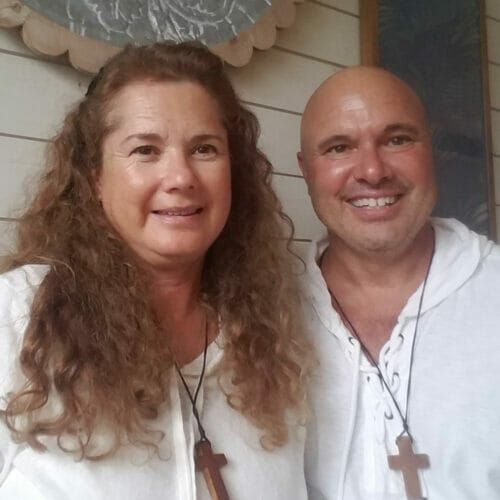
Question: What has been a touching moment as you’ve begun lay formation?
John: There have been so many moments that have touched us and our marriage. Some of those have been very physical – like when as a community we celebrate liturgy together, when we pray together, have meals together, go on a retreat together – and other times those moments have been very subtle. All of us were given these questions ahead of time, so Araceli and I were able to go on a walk this morning and just think about this question and what it means to us and our vocation to marriage and how we find the Lord together. And so, because she’s much more beautiful to gaze upon than me, and has a beautiful accent, she’s actually going to answer the question!
Araceli: Okay, what I’m going to say is not what we talked about! I was thinking about it, and I know it’s true for him as well, is that when we attended the first Shabbat. In this particular way we enter into the presence of God, starting on Friday evening. Then Saturday, then Sunday, and on Sunday afternoon we were able to go back into our regular life, but we were already energized, able to survive or to do a good job, always coming from love, because that is what the weekend gave us. And so the world tells us who we are, but on the weekend, we are reminded who God says we are, not who other people tell us we are. And so we go through Monday, Tuesday, Wednesday, Thursday, and we know Friday, it’s coming! So we rush from school, we drive to Denver, and we know we’re entering into a special place. That even our struggles and upsetness, we know we can leave it and get right on that energy.

Question: What drew you to Disciples of the Lamb?
Colin: God brought the community into my life and I am so excited to have the opportunity to spend more time with its members. I love the community’s charism. It is both deeply liturgical, but also charismatic. This “both, and” proclaims the goodness of the Holy Spirit, and our wonderful Church Tradition. Worshiping God with the Community is a healing and powerful experience. God is doing great things here!
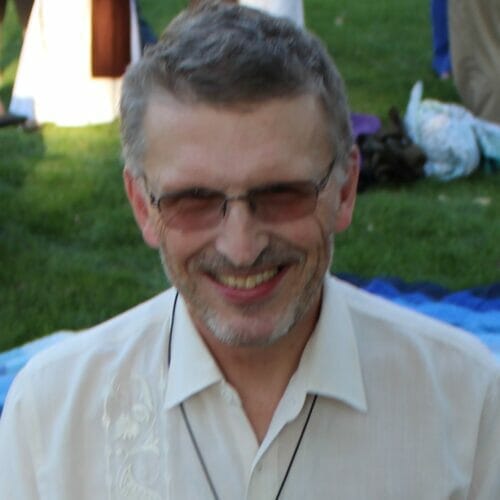
Question: You are a Friend of the Lamb. As a physicist, how do you carry the community charism and life into your work and vocation to be present in the secular world?
Hugh Joseph: I have what you might call an eschatological concern for these people in my work, in the sense that an atheist is someone who has never experienced the love of God; he’s not somebody who doesn’t know about God in their head, but somebody who’s never experienced God. It hurts me that somebody could pass through this life and never have experienced an encounter with God. So I try to pray for people before I go into work – pray for them in the adoration chapel. I have Mass then I do my hour of adoration. And sometimes when I’m passing by them, I’m praying silently. But for myself, to have a concern for these people God has put in front of me… Each moment He’s calling them to live something wonderful and amazing.
As John Bosco said, “Love what they love so that they may love what I love.” So I try to take an interest in their lives in what they love, their sports, and when I have the opportunity to share a little bit about our charism, what I’m doing that evening, where I was that previous weekend… I’ve invited a few people to some liturgies, to Community events now and again. When I’m asked what I do in the secular world, I say, well, first, it’s not enough. But I try to, as Jesus says, gather all the fragments up so that nothing will be lost. And by that I mean that I try to re-center myself on God regularly to gather everything up, back into that inner space, and to reflect where I am and where God is – where I am in front of everyone else. I’m always in the presence of God, in the presence of the Kingdom, and I try to be a witness of that to other people.
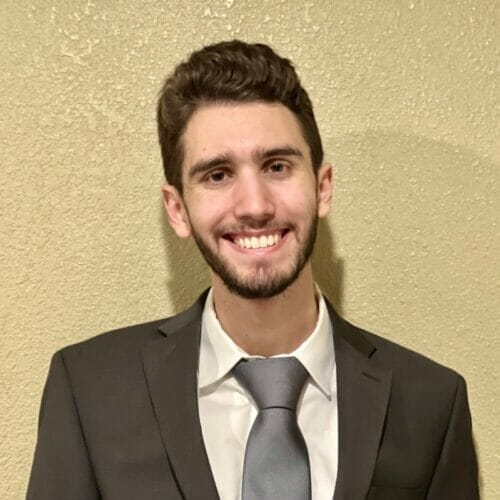
Question: What does it mean to you to be a Disciple of the Lamb?
Michael: Being a Disciple of the Lamb means a lot to me, but I think the major thing it represents is a community. In college freshman year I tried to go my own way, but quickly figured out that our faith was meant to be lived out together. Regardless of how uncomfortable it can be to put yourself out there, ultimately a community can help you grow far more than you could by yourself.
Recently, I graduated from college. One of my biggest worries has been finding a new community to continue to grow in my faith with. Being a Disciple of the Lamb, therefore, is a massive relief to that worry, and I hope to continue to grow closer to my fellow disciples so we can all grow closer to Christ in his church.

Question: What has struck you so far in your time of Friend of the Lamb?
Leonor: I recently joined “Friends of the Lamb.” It was on September 11, 2021. This day happened to be the day of Our Lady of Coromoto “Virgen de Coromoto.” She’s the Patroness of Venezuela. On September 11, 1952, three hundred years after her appearance, the sacred image was crowned by Cardinal Manuel Arteaga y Betancourt.
I currently live in Denver. I come from a family of seven children, plus my mom and dad. I grew up Catholic, went to Catholic High School, and then to a Catholic University. I enjoy the Spirituality of the Beatitudes, and I believe in Adoration of the Blessed Sacrament of the Altar.

Question: What’s your favorite part of being a Disciple of the Lamb?
Ethan: There are many things that attracted me to this group, and make me continually grateful to be a part of the community. The first thing I love about being a Disciple of the Lamb is the community of young adults. We often hang out together and when we do the Holy Spirit is ever present. I also enjoy the talks given to us at meetings by people within the Community of the Beatitudes.
The wisdom that is presented to all of us in these meetings is both awe inspiring and applicable to our daily lives as Christians striving for holiness. Truly, my favorite thing about Disciples of the Lamb comes down to the fact that, through these things (along with the other commitments we make not mentioned here), I grow closer to Christ every day.
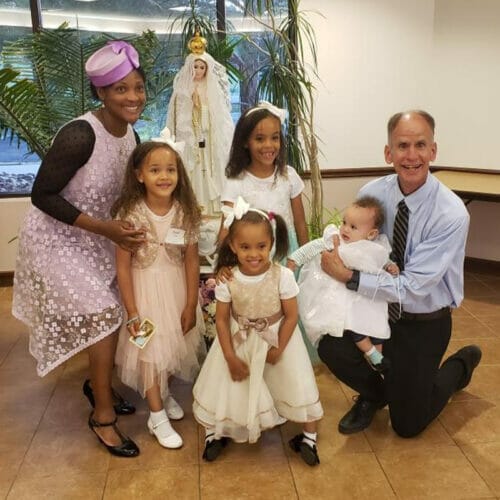
Question: What drew you to Friends of the Lamb?
Toomer family: Gerry and I are both Engineers and we met while we were both in the “Neocatechumenal way.” We were blessed to be part of that movement for about 8 years. There, our faith and relationship grew. We got married 9 years ago and we have been blessed to welcome 4 children in our marriage who are now 2, 5, 7 and 8 years old. As the needs of our family changed, 4 years ago we were blessed to come to know the Community of the Beatitudes.
To be part of the Community of the Beatitudes today has been a source of great peace and Joy for us. We are always welcome to pray or share fellowship with them. Our children can really see and appreciate the beauty of the various states of life that are all present in the Community of the Beatitudes. It is truly a unique privilege for us to be part of such an integrated religious group. We are grateful that our whole family can join the community for the evening liturgy (vespers). There, we all turn towards the Blessed Sacrament on Saturday evenings, and our voices blend together to worship the king of kings with Angelic tunes that really call heaven on earth. As “Friends of the Lamb” in the community, we feel like we are one more time sent to live out our baptism through our state of married- life and family. We feel compelled by the Holy Spirit to live boldly in the world around us with the support of our Beatitudes Community. It is an extreme joy for us to be in this way laborers in the vineyard of the Lord and we are eternally grateful. Thank you dear Jesus, Thank you Denver Community of the Beatitudes.
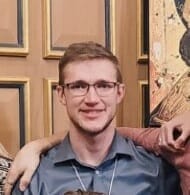
Question: Why did you want to join Disciples of the Lamb and what does it mean to you?
Ben: I met several members of the Community of the Beatitudes long before I heard about Disciples of the Lamb. I was always surprised at the joy they expressed and the fellowship they had with one another. I was particularly shocked at their desire to get to know me personally. Every time I came to vespers or to brunch with the community, I didn’t want to leave. When I left, I felt more valuable to the world than when I had said hello, with a conviction to pay this joy forward somehow. I struggle to make time for prayer in my life, despite having much free time. Being a Disciple of the Lamb does not take away this difficulty but serves to replace the accompanying sense of despair with a hope in God’s enduring mercy and is a reminder that He is always with me through my struggle.
Accountability from the other Disciples serves to strengthen this hope, reminding that I am not alone on the difficult journey of spiritual development and making it easier to fulfill the commitments. I have experienced periods of spiritual highs and lows throughout my life. Before I joined the Disciples of the Lamb, I had merely been along for the spiritual ride, only feeling the highs and lows, instead of recognizing every spiritual state as a unique opportunity to express joy during the highs and faith during the lows. To me it seems that this is an indispensable part of being an authentic disciple of Christ. The Disciples of the Lamb builds ordinary people into disciples and serves as a haven of joy and communion that the Community of the Beatitudes expresses so well, especially in a time when joy and communion are difficult to find.

Question: Jeff, recently you attended an international meeting with the Friends of the Lamb. Please, tell us about your experience.
Jeff: I absolutely loved every minute, and I returned to Denver refreshed, encouraged, and inspired from our time together there. It was so meaningful to receive talks regarding the fuller definition and clarification of both the call and mission of the Friends of the Lamb, and especially the increased emphasis of this path within our Ecclesial Family of Consecrated Life. I was very excited to share all I learned with my brothers and sisters back home!
I was especially happy to meet Sister Anna Katharina, President of the Community of the Beatitudes, and Father Martin, Assistant, again after so many years. What a wonderful grace to hear directly from and speak with the leaders of our Community, and what a blessing to meet and be among brothers and sisters from around the world in doing so.
I felt so sorry and humbled not to be able to speak the language there, but everyone was so gracious and hospitable. I can’t thank you all enough for such a blessed and grace-filled event, I know its effects will be resonating deep in my heart and mind for years to come.

Question: Why did you want to join Disciples of the Lamb?
Josh: I was hunting for a deeper connection to God through community and some help with building some structure into my spiritual life as I struggle a lot with consistency in prayer. I first encountered the Community of the Beatitudes at vespers, followed by dinner and Israeli dancing, which felt odd at first, but as I became more comfortable, I started to recognize that God was working in my life in this moment in a way that revealed my heart to myself. I was learning to connect with God in different ways than through the drudgery-filled approach I often had to prayer. When I learned about the ways the community prayed (through song before and after meals, and through Israeli dancing) I discovered God reaching me in a way that spoke to my soul in a beautiful way, and allowed me to offer my heart to God more completely.
Because of the joy, and beautiful model of communal life that I found in the community, I decided to join the Disciples of the Lamb. In these brothers and sisters, I have found deep peace and joy. I have come to know the love of God for me through them, the priests and sisters of this community, and I have seen the type of joy God desires for me through the witness of these people. I am growing in my prayer life, and relationship with God at a slow pace that is so far appearing to be exactly what I need. I love this community, God is slowly drawing me closer to his heart through it. Thank you Jesus for this gift.

Question: How does your relationship with the community help you on your journey of faith?
Sophie: I’ve noticed that as I grow closer with the members of the Community of the Beatitudes and their distinctive spirituality, I fall deeper and deeper in love with our Lord Jesus, his Spirit is so alive there. I feel at home when I’m around the community. I noticed it especially during my first time at Saturday Vespers. The joy that I felt singing the psalms and hymns was beautifully overwhelming and it just felt so right! Being a Disciple of the Lamb means a great deal to me because it means we get to experience the charism of the community in an intimate way. Their spiritual guidance has helped me come to know the Father in a new and powerful way. The fellowship that happens when at a meal in the community house, whether that’s Sunday lunch or Shabbat, is so authentic and uplifting! Their special focus on the Jewish roots of our faith is so unique, it’s perhaps one of my favorite aspects of Community of the Beatitudes. Being around the community has both renewed and strengthened my faith in Christ, I am forever grateful.

Question: What does the fraternity that you experience in the group of the Disciples of the Lamb bring you?
McKenna: Living as a young person who takes their faith seriously is such a joyful experience, but sometimes it feels like you are surrounded by people who do not share the same care for having a relationship with Jesus! The fraternity I have experienced with the Disciples of the Lamb is so important to me because we are creating intentional community centered on Christ. Finding a group of young people who all care about the same thing can be tough to find, and I’m grateful to be developing friendships that aren’t just a result of circumstance or convenience. Living as a witness for Christ as a young person becomes so much richer when we have the fraternity of our peers to fall back on and draw inspiration from.
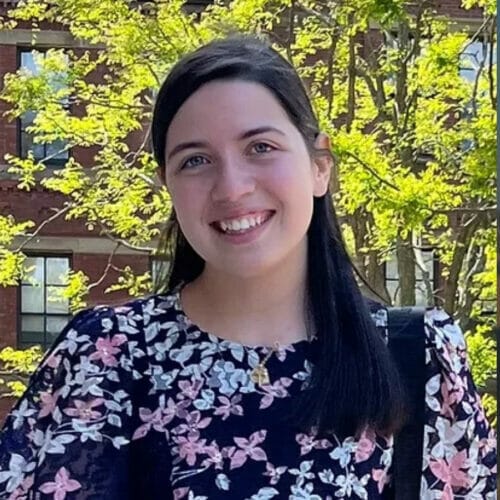
Question: What touches you in the charism of the community?
Maria: The Charism of this Community has touched my heart deeply. In Acts 2:42-46, St Luke describes the early Christians, who, afire with the Holy Spirit, lived a profoundly communal life, praying and working together, while at the same time representing different vocations and ministries. The Community of the Beatitudes embodies this deeply communal life: brothers, sisters, and lay members, Christians afire with the charisms of the Holy Spirit, form part of one ecclesial family which prays and works together, emboldened by the beauty of daily, ordinary life to give extraordinary witness to Jesus.
The Community of the Beatitudes is centered on the Mass, the Beauty of the Liturgy, and a life of prayer before our Eucharistic Lord and beside Our Blessed Mother. Closely following St. Thérèse’s “Little Way,” the Community shares her spirituality of encountering God in the inner heart, His merciful Love and His universal call to sanctity. Also, the Community responds to the needs of the local, growing church and so grew in ministries that would serve to share the Good News and help others to encounter Jesus more deeply. This means that the apostolates of the Community cover many areas of work and mission: teaching, evangelization, healing ministries, families and children, ecclesial ministries, parish, and more.
In short, the charism of the Community has touched me because I experience “the fire of the early Church” – the Holy Spirit – fully alive and revealing His Eternal Beauty – ancient and ever new!
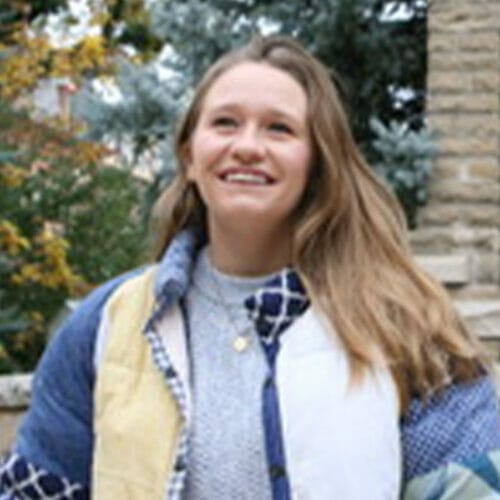
Question: You are committed to praying daily with the Word of God, how does the Word of God strengthen your faith?
Molly: Disciples of the Lamb make a commitment to read thirty minutes of scripture every day. For me, this has been a great challenge but also a great joy. The Word of God has become a salve to my chronically anxious soul. At first, this went unnoticed. However, as I dove deeper and deeper into the Gospels, I became increasingly aware of the fact that, as a college student, I live in a constant state of noise and anxiety. I am constantly reaching and grasping for the next thing to do, the next place to be, etc. When reading scripture, I become still; I am placed in the presence of a God who is present in every moment, waiting for me to come to Him. To me, reading scripture has become more than just computing words on a page. It is a process of being nourished, physically and spiritually. The Word of God is living and true; because of it, my faith has been strengthened in a multitude of ways. I am more sensitive to the Lord’s voice in my mind throughout the day. I better understand how the Lord is working in my life, who God is to me, who I am to God, and what it truly means to be His disciple. Praise the Lord!
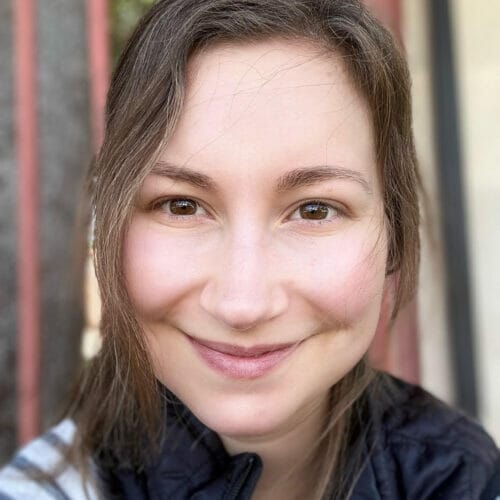
Question: The Community of the Beatitudes desires to express the beauty of God in different ways. How do you live this dimension of our charism?
Megan: The emphasis on beauty is one of the charisms that initially drew me to the Community; as a painter and musician, it is not difficult to understand why. But this attraction to participating in the beauty of God is not limited to the life and work of an artist; the beauty of God permeates all that is true and good, and thus is part of that transfiguring light that touches all of humanity. A very important part of participating in God’s beauty is attentiveness. Just as I recollect myself before the presence of God in the Tabernacle, do I recollect myself throughout my day before the presence of God in the beautiful goodness of life, His love freely given in creation? Certainly, I can participate in the beauty of God expressed in the holy liturgies, but for me, it is essential that this participation does not stop once I leave my time of prayer. The more I am transformed by Beauty Himself, the more I am capable of creating beauty in the world around me, whether that is in my decisions and actions, the way I speak, or even concretely how I choose to set the table or stopping on the side of the road to pick the wildflowers. In this way, the horizons of life expand as each moment becomes an opportunity to enter into the ongoing participation in the beautiful work of God’s new creation.
